- Home
- Albert Camus
The First Man Page 3
The First Man Read online
Page 3
And the wave of tenderness and pity that at once filled his heart was not the stirring of the soul that leads
a. Transition.
the son to the memory of the vanished father, but the overwhelming compassion that a grown man feels for an unjustly murdered child—something here was not in the natural order and, in truth, there was no order but only madness and chaos when the son was older than the father. The course of time itself was shattering around him while he remained motionless among those tombs he now no longer saw, and the years no longer kept to their places in the great river that flows to its end. They were no more than waves and surf and eddies where Jacques Cormery was now struggling in the grip of anguish and pity.a He looked at the other inscriptions in that section and realized from the dates that this soil was strewn with children who had been the fathers of graying men who thought they were living in this present time. For he too believed he was living, he alone had created himself, he knew his own strength, his vigor, he could cope and he had himself well in hand. But, in the strange dizziness of that moment, the statue every man eventually erects and that hardens in the fire of the years, into which he then creeps and there awaits its final crumbling—that statue was rapidly cracking, it was already collapsing. All that was left was this anguished heart, eager to live, rebelling against the deadly order of the world that had been with him for forty years, and still struggling against the wall that separated him from the secret of all life, wanting to go farther, to go beyond, and to discover, discover before dying, dis-
a. enlarge on war of 1914.
cover at last in order to be, just once to be, for a single second, but forever.
He looked back on his life, a life that had been foolish, courageous, cowardly, willful, and always straining toward that goal which he knew nothing about, and actually that life had all gone by without his having tried to imagine who this man was who had given him that life and then immediately had gone off to die in a strange land on the other side of the seas. At twenty-nine, had he himself not been frail, been ailing, tense, stubborn, sensual, dreamy, cynical, and brave? Yes, he had been all that and much else besides; he had been alive, in short had been a man, and yet he had never thought of the man who slept there as a living being, but as a stranger who passed by on the land where he himself was born, of whom his mother said that he looked like him and that he died on the field of battle. Yet the secret he had eagerly sought to learn through books and people now seemed to him to be intimately linked with this dead man, this younger father, with what he had been and what he had become, and it seemed that he himself had gone far afield in search of what was close to him in time and in blood. To tell the truth, he had gotten no help. In a family where they spoke little, where no one read or wrote, with an unhappy and listless mother, who would have informed him about this young and pitiable father? No one had known him but his mother and she had forgotten him. Of that he was sure. And he had died unknown on this earth where he had fleetingly passed, like a stranger. No doubt it was up to him to ask, to inform himself. But for someone
like him, who has nothing and wants the world entire, all his energy is not enough to create himself and to conquer or to understand that world. After all, it was not too late; he could still search, he could learn who this man had been who now seemed closer to him than any other being on this earth. He could ...
Now the afternoon was coming to its end. The rustle of a skirt, a black shadow, brought him back to the landscape of tombs and sky that surrounded him. He had to leave; there was nothing more for him to do here. But he could not turn away from this name, those dates. Under that slab were left only ashes and dust. But, for him, his father was again alive, a strange silent life, and it seemed to him that again he was going to forsake him, to leave his father to haunt yet another night the endless solitude he had been hurled into and then deserted. The empty sky resounded with a sudden loud explosion: an invisible airplane had crossed the sound barrier. Turning his back on the grave, Jacques Cormery abandoned his father.
3 : Saint-Brieuc and Malan (J.G.)a
That evening at dinner, J.C. watched his old friend attack his second slice of leg of lamb with a sort of disturbing voracity; the wind that had come up was growling softly around the small low-ceilinged house in a district near the road to the beaches. On his arrival J.C. had noticed some small pieces of dry algae in the gutter bordering the sidewalk, which, with their odor of salt, were all that suggested the nearness of the sea.
Victor Malan, who spent his entire career in customs administration, had retired to this small town; he had not chosen it, but he justified the choice after the fact by saying that nothing came along to distract him from solitary meditation, neither an excess of beauty nor an excess of ugliness, nor of solitude itself. The administration of things and the management of men had taught him a great deal, but first of all, apparently, that we know very little. Yet he was immensely cul-
a. Chapter to be written and deleted.
tivated and J.C. admired him unreservedly, for Malan, in a day when outstanding men are so banal, was the one person who had his own way of thinking, to the extent that that is possible. At any rate, under his deceptively accommodating exterior, he was free and uncompromisingly original in his opinions.
"That's it, my son," Malan was saying. "Since you're going to see your mother, try to find out something about your father. And come back—at top speed—and tell me what happened next. I so seldom find anything to laugh about."
"Yes, it's ridiculous. But now that my curiosity is aroused I might as well try to pick up some more information. It's a bit pathological that I've never concerned myself with it."
"Not at all, it's wisdom in this case. I was married for thirty years to Marthe, whom you knew. A perfect woman and I still miss her. I always thought she liked her house."1
"No doubt you're right," Malan was saying, looking away, and Cormery waited for the objection that was bound to follow his approval.
"Nonetheless," Malan resumed, "I myself, and I am surely mistaken, I would restrain myself from trying to learn more than life has taught me. But I am a bad example in this respect, am I not? When all is said and done, it's surely a fault in me that I would make no such
1. This and the two preceding paragraphs are crossed out.
attempt. Whereas you"—and his eyes lit up mischievously—"you are a man of action."
Malan had a Chinese look, with his moon face, a somewhat flattened nose, scarcely any eyebrows, a bowl-cut hairdo, and a big moustache that failed to cover his thick, sensual lips. His soft, rounded body, the fleshy hand with pudgy fingers suggested a mandarin who disapproved of traveling by foot. When he half closed his eyes while eating heartily, you could not help seeing him in a silk robe holding chopsticks between his fingers. But the expression changed all that. The feverish dark-brown eyes, restless or suddenly intent, as if the mind was focused on a very specific point, were the eyes of an Occidental of great sensitivity and culture.
The elderly maid brought a cheese tray, which Malan ogled out of the corner of his eye. "I knew a man," he said, "who after he had lived with his wife for thirty years . . ." Cormery paid close attention: whenever Malan began with "I knew a man who . . ." or "a friend . . ." or "an Englishman who was traveling with me . . ." you could be sure he was talking about himself . . . "who didn't like pastries and his wife never ate them either. Well, after twenty years of living together, he caught his wife in the pastry shop, and by keeping an eye on her he found out that she went there several times a week to stuff herself with coffee eclairs. Yes, he thought she didn't like sweets while in fact she loved coffee eclairs."
"So," said Cormery, "we never know anyone."
"If you will. But it might perhaps be more accurate, it
seems to me, in any case I think I would prefer to say, but blame it on my inability to state anything positively— yes, suffice it to say that if twenty years of living together are not enough to know a person, then an inquiry th
at is bound to be superficial forty years after a man's death, runs the risk of bringing you only limited information, yes, one can say information with limited meaning about this man. Although, in another sense ..."
He lifted a knife and, with a fatalistic air, brought it down on the goat cheese. "Excuse me. Won't you have some cheese? No? Still so abstemious! It's a hard job pleasing you!" Again there was a mischievous gleam in his half-closed eyes.
Cormery had known his old friend for twenty years now (add here why and how), and he accepted his irony with good humor. "It's not a matter of pleasing me. Eating too much makes me heavy, and I sink."
"Yes, and then you no longer soar over the rest of us."
Cormery gazed at the handsome rustic furniture that filled the low-ceilinged dining room with its whitewashed beams. "My friend," he said, "you've always thought I was arrogant. I am, but not always or with everyone. With you, for example, I'm incapable of arrogance."
Malan looked away, which in him was a sign of emotion. "I know that," he said. "But why is it?"
"Because I love you," Cormery said quietly.
Malan pulled the bowl of chilled fruit toward him. He said nothing.
"Because," Cormery went on, "when I was very
young, very foolish, and very much alone—you remember, in Algiers?—you paid attention to me and, without seeming to, you opened for me the door to everything I love in the world."
"Oh, you were gifted."
"Of course. But even the most gifted person needs someone to initiate him. The one that life puts in your path one day, that person must be loved and respected forever, even if he's not responsible. That is my faith!"
"Yes, yes," Malan said blandly.
"I know you find that hard to believe. Mind you, do not think that my affection for you is blind. You have great, very great faults, at least in my eyes."
Malan licked his thick lips. Suddenly he seemed interested. "What faults?"
"For example you are, let us say, thrifty. Not out of avarice, it's true, but out of fear, fear of going without, and so forth. All the same, it's a serious fault, one that I generally dislike. But, above all, you cannot help suspecting others of ulterior motives. You are instinctively unable to believe that anyone has disinterested opinions."
"Look here," said Malan as he finished his wine, "I shouldn't have coffee, and yet. . ."
But Cormery kept his self-possession.a "For example, I'm sure you couldn't bring yourself to believe me if I
a. I often lend money that I know I'll never get back, to people I don't care about. It's just that I don't know how to say no, and that exasperates me.
told you that if you were just to ask, I would immediately give you everything I have."
Malan hesitated, and now he was looking at his friend. "Oh, I know. You're generous."
"No, I am not generous. I'm stingy with my time and my energy, with anything that tires me, and that disgusts me. But what I said is true. You—you don't believe me, and that is a fault in you, that is where you are really helpless, even though you are a superior man. Because you're wrong. One word from you, right now, and everything I have is yours. You have no need of it and it's only an example. But I didn't choose it arbitrarily. Truly, everything I have is yours."
"Thank you, really," Malan said, his eyes half closed. "I am very touched."
"All right, I'm embarrassing you. You don't like people to speak too openly. I just wanted to tell you that with all your faults I love you. I love or revere very few people. As for the rest, I'm ashamed of my indifference to them. But for those I love, nothing and no one, neither I nor certainly they themselves, can ever make me stop loving them. It took me a long time to learn that; now I know it. That being said, let's go on with our conversation: you don't approve of my trying to find out about my father."
"No—that is to say, I do approve. I was just afraid you'd be disappointed. A friend of mine who was very attracted to a young woman and wanted to marry her made the mistake of asking others about her."
"A bourgeois," Cormery said.
"Yes," Malan said, "I was the one." They both burst
out laughing. "I was young. I collected such contradictory opinions about her that my own view of her became confused. I wasn't sure whether or not I loved her. In short, I married another woman."
"I can't find myself a second father."
"No, and luckily so. One is enough, if I can go by my own experience."
"All right," said Cormery. "Anyhow, I have to go see my mother in a few weeks. That gives me an opportunity. I spoke to you about it particularly because I was disturbed a while back by that difference in age in my favor. Yes, in my favor."
"Yes, I understand."
Cormery looked at Malan.
"Tell yourself he never grew old," Malan said. "He was spared that suffering, and it is long."
"Along with a certain number of pleasures."
"Yes, you love life. You have to, since that's all you believe in." Malan seated himself heavily in a cretonne-covered easy chair, and suddenly a look of inexpressible melancholy came over his face.
"You're right," said Cormery. "I've loved life, I'm hungry for it. At the same time, life seems horrible to me, it seems inaccessible. That is why I am a believer, out of skepticism. Yes, I want to believe, I want to live, forever." Cormery fell silent.
"At sixty-five, every year is a stay of execution," Malan said. "I would like to die in peace, and dying frightens me. I have accomplished nothing."
"There are people who vindicate the world, who help others live just by their presence."
"Yes, and they die," Malan said.
They were silent, and the wind blew a little harder around the house.
"You're right, Jacques," said Malan. "Go find out. You no longer need a father. You brought yourself up alone. Now you could love him as you know how to love. But. . ." he said, and he hesitated. "Come back to see me. I don't have much time left. And forgive me . ..
"Forgive you?" said Cormery. "I owe everything to you.
"No, you don't owe me very much. Just forgive me for sometimes not knowing how to respond to your affection."
Malan gazed at the antique lamp hanging over the table, and his voice was hollow when he said what a few minutes later Cormery, alone in the wind in the deserted neighborhood, would keep on hearing over and over:
"There is a terrible emptiness in me, an indifference that hurts . . ."a
a. Jacques / I tried to find out for myself, from the start, when I was a child, what was right and what was wrong—because no one around me could tell me. And now that everything is leaving me I realize I need someone to show me the way and to blame me and praise me, by right not of power but of authority, I need my father.
I thought I knew it, and that I had myself in hand, I don't [know?] any longer.
4 : The Child's Games
A gentle short swell was making the ship roll in the July heat. Jacques Cormery, lying half naked in his cabin, watched the fragmented reflection of the sunlight on the sea dancing on the copper rim of the porthole. He jumped to his feet to turn off the fan that was drying the perspiration in his pores before it even began to trickle down his chest; it was better to sweat. Then he relaxed on his bunk, narrow and hard as he liked a bed to be. Now the dull sound of the engines rose from the depths of the ship in muffled vibrations, like an enormous army forever on the march. He liked the sound these big steamers made, night and day, and the sensation of walking on a volcano, while all around the immense sea offered its open reaches to his view. But it was too hot on the deck; after lunch, passengers besotted with food had collapsed in the deck chairs on the covered deck or had fled down the passageways belowdecks at siesta time. Jacques did not like to take a siesta. "A benidor," he thought bitterly: that was the bizarre expression his grandmother used when he was a child in Algiers and
she was making him join her for the siesta. The three rooms of the small apartment in an Algiers neighborhood were enveloped in
the striped shade of the carefully closed shutters.a Outside, the heat was baking the dry dusty streets, and, in the half-light of the rooms, one or two big energetic flies were buzzing around like airplanes as they searched tirelessly for a way out. It was too hot to read Pardaillan or L'Intrepide.b On rare occasions when his grandmother wasn't home or was chatting with the neighbor, the child would poke his nose through the shutters in the living room that faced the street. The street was deserted. The red and yellow canvas shades had been pulled down in front of the shoe and notions stores across the street, a curtain of multicolored beads masked the entrance to the tobacco shop, and Jean's cafe was empty except for the cat lying on the sill between the sawdust-covered floor and the dusty sidewalk, and sleeping as if it were dead.
The child then turned back to the sparse whitewashed room, furnished with a square table in the middle, and, against the walls, a sideboard, a small desk that was scarred and spotted with ink, and, on the floor, a small mattress covered with a blanket where, after nightfall, his half-mute uncle slept; and five chairs.c In a
a. Around his tenth year.
b. Those big books printed on newsprint, with crudely colored covers on which the price was printed in bigger type than the title or the name of the author.
c. extreme cleanliness.
. A wardrobe, a wooden dressing table with a marble top. A bed-
corner, on a mantelpiece of which only the shelf was made of marble, stood a small flowered vase with slender neck, of the kind one finds at a fair. The child, caught between the two deserts of sunlight and shade, started circling the table at a hurried pace, repeating like a litany: "I'm bored! I'm bored!" He was bored, yet in that boredom was a game, a delight, a kind of excitement, for rage would seize him as he heard his grandmother calling a benidor when at last she came home. But his protests were in vain. The grandmother had raised nine children in the bush, and she had her own ideas on upbringing. With a single shove she pushed him into the bedroom. It was one of two rooms that looked out onto the yard. The other had two beds, his mother's and the one he shared with his brother. His grandmother was entitled to a room of her own. But she would take the child in her big high wooden bed, often for the night and always for the siesta. He would take off his sandals and lift himself onto the bed. He had to take his place at the back, against the wall, ever since the day he slipped to the floor while his grandmother was sleeping, to resume circling around the table and reciting his litany. Once in his place, he would watch his grandmother take off her dress and drop her coarse linen shift, fastened at the top by a drawstring with a ribbon that she would undo. Then she in turn got up on the bed, and the child smelled beside him the odor of el-side rug with knotted stitches, worn and dirty, frayed at the edges. And in a corner, a big trunk covered with an old tasseled Arab rug.

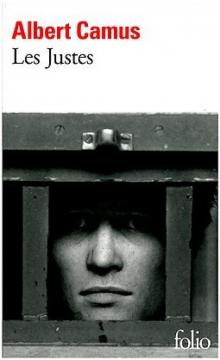 Les Justes
Les Justes The Sea Close By
The Sea Close By The Stranger
The Stranger The Rebel: An Essay on Man in Revolt
The Rebel: An Essay on Man in Revolt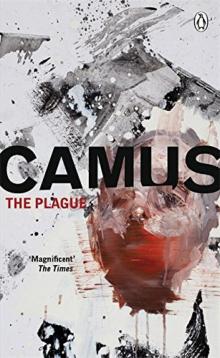 The plague
The plague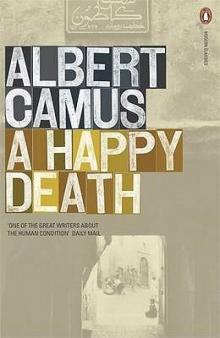 A Happy Death
A Happy Death The Myth of Sisyphus and Other Essays
The Myth of Sisyphus and Other Essays The Fall
The Fall Resistance, Rebellion, and Death
Resistance, Rebellion, and Death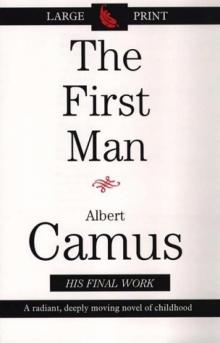 The First Man
The First Man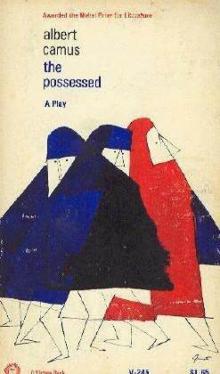 The Possessed
The Possessed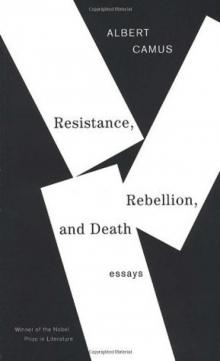 Resistance, Rebellion and Death: Essays
Resistance, Rebellion and Death: Essays